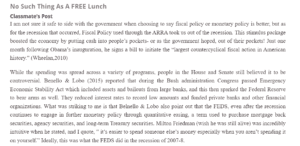Economic Situation
Response to Classmate
Hello, Your views on the current economic situation in the US offer a whole new perspective. This is how everyday Americans would voice their opinion. As you said, we are indeed getting too big for our britches. The country is in massive debt, and someone will have to pay it; that someone is me and you, the average American (Proverbs 22:7. The rich rule over the poor, and the borrower is the slave to the lender). Even though the average interest rates are low and the unemployment rates are standard as well, somehow, this does not translate to a better economy.
Are you in need of a new and genuine copy of“Economic Situation”? Get in touch with us.
As I mentioned, when the economy is already heavily indebted, a monetary policy that stimulates borrowing is not the best solution. In such a case, QE, which aims to encourage spending, investment, and lower interest, is also ineffective. Fiscal policy will have a tangible result when the private sector increases its spending following an increase in its financial wealth (Fullwiller & Wray, 2010). So, when taxes are reduced, employment rates can increase in private sectors, production rises, wealth is created, and a better economic outcome is achieved. Genesis 2:15 The Lord God took the man and put him in the garden of Eden to work it and keep it. The government and the private sector need to reach a mutual ground where the work in the park does not corrupt the park but allow it to bear fruit for the sower and the owner.
Similar Post: Homeland Security
Reference
Fullwiler, S. T., & Wray, L. R. (2010). Quantitative easing and proposals for reform of monetary policy operations. Bard College Levy Economics Institute Working Paper, (645).
ORDER A PLAGIARISM-FREE PAPER HERE
We’ll write everything from scratch
Question
No Such Thing As A FREE Lunch
Classmate’s Post
I am not sure it is safe to side with the government when choosing to say fiscal policy or monetary policy is better, but as for the recession that occurred, Fiscal Policy used through the ARRA took us out of the recession. This stimulus package boosted the economy by putting cash into people’s pockets- or, as the government hoped, out of their pockets! Just one month following Obama’s inauguration, he signs a bill to initiate the “largest countercyclical fiscal action in American history” (Wheelan,2010).

Economic Situation
While the spending was spread across various programs, people in the House and Senate still believed it controversial. Benello & Lobo (2015) reported that during the Bush administration, Congress passed Emergency Economic Stability Act which included assets and bailouts from large banks, which sparked the Federal Reserve to bear arms. They reduced interest rates to record low amounts and funded private banks and other financial organizations. What was striking to me is that Belnello & Lobo also point out that the FEDS, even after the recession, continues to engage in further monetary policy through quantitative easing, a term used to purchase back mortgage securities, agency securities, and long-term Treasury securities. Milton Friedman (I wish he were still alive) was incredibly intuitive when he stated, and I quote, “it’s easier to spend someone else’s money especially when you aren’t spending it on yourself.” Ideally, this was what the FEDS did in the recession of 2007-8.
The economist’s theory that “there is no such thing as a free lunch” made me ponder fiscal policy and whether it was the “solution” to the recession. From the FRED analysis snapshot, the CPI of this county is on the rise as unemployment rates remain the lowest they have ever been. Coupled with that, our interest rates are low right now too. This triple threat is not something to be proud of, Mr. President. There is no such thing as a free lunch that captures the issues still ahead. “You don’t get something for nothing.”
This is precisely what Jesus thought when the Pharisees asked him his opinion of paying taxes to Ceasar or not. After calling the Pharisees hypocrites, Jesus said to pay Ceasar what is his and God what is God. As Christians, we know that everything we have is God’s, and we pay our taxes even when that government is not God-honoring. Christians must pay our fair share, but what is fair? Do you submit your life to Ceasar (government), or do we steward ourselves to be called the ultimate citizens of heaven? (Philippians 3:20)
To conclude, I do think that the fiscal policy that the Obama administration approved did perpetuate the success that our country continues to have, but all good things come to an end. “We are getting too big for our britches.” Our national debt is too high; someone must pay for that. Cutting taxes may cause a depreciation on new investments, yet there is no money right now to make this decision in the next couple of years potentially. I think fiscal policy took us out of the recession, but I am unsure if it will answer the next downturn.
References
Bonello, F. & Lobo, I. (2015). Taking sides: Clashing Views on Economic Issues. (16th Ed.) https://fred.stlouisfed.org/
Wheelan, C. (2014). Naked Economics: Undressing the dismal science.
Client’s Notes:
- Hi, I need help responding to a fellow student concerning her response about the discussion topic. I attached a copy of my fellow student’s reply to the problem. Can you add a biblical perspective, too? Thank you

